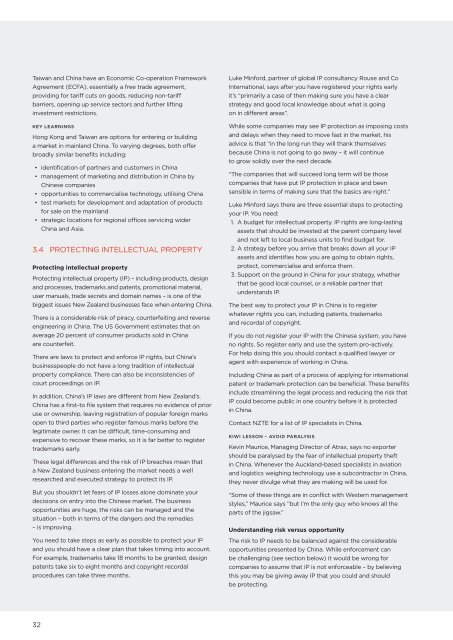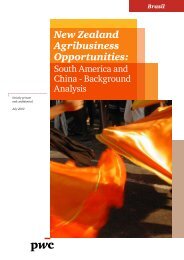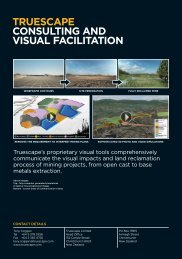Navigating China Guide (2012) - New Zealand Trade and Enterprise
Navigating China Guide (2012) - New Zealand Trade and Enterprise
Navigating China Guide (2012) - New Zealand Trade and Enterprise
You also want an ePaper? Increase the reach of your titles
YUMPU automatically turns print PDFs into web optimized ePapers that Google loves.
Taiwan <strong>and</strong> <strong>China</strong> have an Economic Co-operation Framework<br />
Agreement (ECFA), essentially a free trade agreement,<br />
providing for tariff cuts on goods, reducing non-tariff<br />
barriers, opening up service sectors <strong>and</strong> further lifting<br />
investment restrictions.<br />
KEY LEARNINGS<br />
Hong Kong <strong>and</strong> Taiwan are options for entering or building<br />
a market in mainl<strong>and</strong> <strong>China</strong>. To varying degrees, both offer<br />
broadly similar benefits including:<br />
• identification of partners <strong>and</strong> customers in <strong>China</strong><br />
• management of marketing <strong>and</strong> distribution in <strong>China</strong> by<br />
Chinese companies<br />
• opportunities to commercialise technology, utilising <strong>China</strong><br />
• test markets for development <strong>and</strong> adaptation of products<br />
for sale on the mainl<strong>and</strong><br />
• strategic locations for regional offices servicing wider<br />
<strong>China</strong> <strong>and</strong> Asia.<br />
3.4 PROTECTING INTELLECTUAL PROPERTY<br />
Protecting intellectual property<br />
Protecting intellectual property (IP) – including products, design<br />
<strong>and</strong> processes, trademarks <strong>and</strong> patents, promotional material,<br />
user manuals, trade secrets <strong>and</strong> domain names – is one of the<br />
biggest issues <strong>New</strong> <strong>Zeal<strong>and</strong></strong> businesses face when entering <strong>China</strong>.<br />
There is a considerable risk of piracy, counterfeiting <strong>and</strong> reverse<br />
engineering in <strong>China</strong>. The US Government estimates that on<br />
average 20 percent of consumer products sold in <strong>China</strong><br />
are counterfeit.<br />
There are laws to protect <strong>and</strong> enforce IP rights, but <strong>China</strong>’s<br />
businesspeople do not have a long tradition of intellectual<br />
property compliance. There can also be inconsistencies of<br />
court proceedings on IP.<br />
In addition, <strong>China</strong>’s IP laws are different from <strong>New</strong> <strong>Zeal<strong>and</strong></strong>’s.<br />
<strong>China</strong> has a first-to file system that requires no evidence of prior<br />
use or ownership, leaving registration of popular foreign marks<br />
open to third parties who register famous marks before the<br />
legitimate owner. It can be difficult, time-consuming <strong>and</strong><br />
expensive to recover these marks, so it is far better to register<br />
trademarks early.<br />
These legal differences <strong>and</strong> the risk of IP breaches mean that<br />
a <strong>New</strong> <strong>Zeal<strong>and</strong></strong> business entering the market needs a well<br />
researched <strong>and</strong> executed strategy to protect its IP.<br />
But you shouldn’t let fears of IP losses alone dominate your<br />
decisions on entry into the Chinese market. The business<br />
opportunities are huge, the risks can be managed <strong>and</strong> the<br />
situation – both in terms of the dangers <strong>and</strong> the remedies<br />
– is improving.<br />
You need to take steps as early as possible to protect your IP<br />
<strong>and</strong> you should have a clear plan that takes timing into account.<br />
For example, trademarks take 18 months to be granted, design<br />
patents take six to eight months <strong>and</strong> copyright recordal<br />
procedures can take three months.<br />
Luke Minford, partner of global IP consultancy Rouse <strong>and</strong> Co<br />
International, says after you have registered your rights early<br />
it’s “primarily a case of then making sure you have a clear<br />
strategy <strong>and</strong> good local knowledge about what is going<br />
on in different areas”.<br />
While some companies may see IP protection as imposing costs<br />
<strong>and</strong> delays when they need to move fast in the market, his<br />
advice is that “in the long run they will thank themselves<br />
because <strong>China</strong> is not going to go away – it will continue<br />
to grow solidly over the next decade.<br />
“The companies that will succeed long term will be those<br />
companies that have put IP protection in place <strong>and</strong> been<br />
sensible in terms of making sure that the basics are right.”<br />
Luke Minford says there are three essential steps to protecting<br />
your IP. You need:<br />
1. A budget for intellectual property. IP rights are long-lasting<br />
assets that should be invested at the parent company level<br />
<strong>and</strong> not left to local business units to find budget for.<br />
2. A strategy before you arrive that breaks down all your IP<br />
assets <strong>and</strong> identifies how you are going to obtain rights,<br />
protect, commercialise <strong>and</strong> enforce them.<br />
3. Support on the ground in <strong>China</strong> for your strategy, whether<br />
that be good local counsel, or a reliable partner that<br />
underst<strong>and</strong>s IP.<br />
The best way to protect your IP in <strong>China</strong> is to register<br />
whatever rights you can, including patents, trademarks<br />
<strong>and</strong> recordal of copyright.<br />
If you do not register your IP with the Chinese system, you have<br />
no rights. So register early <strong>and</strong> use the system pro-actively.<br />
For help doing this you should contact a qualified lawyer or<br />
agent with experience of working in <strong>China</strong>.<br />
Including <strong>China</strong> as part of a process of applying for international<br />
patent or trademark protection can be beneficial. These benefits<br />
include streamlining the legal process <strong>and</strong> reducing the risk that<br />
IP could become public in one country before it is protected<br />
in <strong>China</strong>.<br />
Contact NZTE for a list of IP specialists in <strong>China</strong>.<br />
KIWI LESSON – AVOID PARALYSIS<br />
Kevin Maurice, Managing Director of Atrax, says no exporter<br />
should be paralysed by the fear of intellectual property theft<br />
in <strong>China</strong>. Whenever the Auckl<strong>and</strong>-based specialists in aviation<br />
<strong>and</strong> logistics weighing technology use a subcontractor in <strong>China</strong>,<br />
they never divulge what they are making will be used for.<br />
“Some of these things are in conflict with Western management<br />
styles,” Maurice says “but I’m the only guy who knows all the<br />
parts of the jigsaw.”<br />
Underst<strong>and</strong>ing risk versus opportunity<br />
The risk to IP needs to be balanced against the considerable<br />
opportunities presented by <strong>China</strong>. While enforcement can<br />
be challenging (see section below) it would be wrong for<br />
companies to assume that IP is not enforceable – by believing<br />
this you may be giving away IP that you could <strong>and</strong> should<br />
be protecting.<br />
32
















